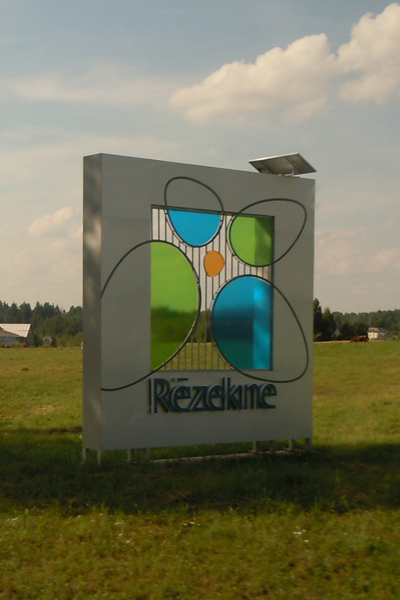 It takes me almost 5 hours of bus to do the 270 km that separate me from Rezekne to Riga. But the weariness disappears when the bus entered the city. I'm finally in Rezekne, city pillar of my trip. Well, I thought. The trips have their share of unexpected surprises and unfortunately, my interviews are refused at the Social Centre. I still have three days to find one another and meet young people. Done: the project has a new partner, the youth center "Jacis Centrs". I begin my city tour.
It takes me almost 5 hours of bus to do the 270 km that separate me from Rezekne to Riga. But the weariness disappears when the bus entered the city. I'm finally in Rezekne, city pillar of my trip. Well, I thought. The trips have their share of unexpected surprises and unfortunately, my interviews are refused at the Social Centre. I still have three days to find one another and meet young people. Done: the project has a new partner, the youth center "Jacis Centrs". I begin my city tour. A little bit shadow town, Rezekne was almost completely destroyed during the Second World War because of bombing. I stroll peacefully in the streets, discovering every minute a Russian city, not a Latvian one. Moscow is 600 km, the buildings date from the Soviet Union: towering, red brick, stark and unwelcoming. I definitevelly prefer the charm of Riga. On the horizon, rises a small Orthodox church with its blue roof or the ruins of a Liv castle. In a park, a monument for dead soldiers. Most notable is the statue of Mara, destroyed by the Soviets in 1940 and erected again in 1992 at its feet, a symbolic inscription "United Latvia".
Viewed this way, the town does not seem very attractive. I stay at Vita's and our discussions about politics in Rezekne teach me more about the history and organization of the city.
Rezekne has 39,000 inhabitants and in recent years has a negative migration balance. In the last elections in 2009, 17 parties were presented with 11 Russian parties and six Latvian parties. The Russians have won through their coalition and only two Latvian are involved in the city council. It is divided between 10 members of the Saskcana ("Harmony", the Russian left), two members of Vienotā Rezekne ("Rezekne United" liberal right in Latvia) and a member of Pirma Partija Latvija (" For Good Latvia", the Latvian National right Party).
For Latvian, it's a big defeat, and especially the opportunity, once again, to blame the Russian community. The challenge is simple: this community is socially privileged and it is difficult to argue the Latvian identity. Many young people prefer to leave the city or the country in search of a better social climate.
But when you know that 50% of the population of the city's Russian, you'd think it is normal that the Mayor and City Council majority is in this community. In this reflection, Mara, involved in a political party in Latvia "Vienotā Rezekne" uttered: for her, Latvia is for Latvians and despite the years of occupation and Soviet influence, there is no question that Russian politics gains more ground.
Since 2004 Latvia is part of the European Union and is increasingly opening up to the West, the Russian community enjoys the benefits of mobility, social welfare, while being tied to Moscow. Who said politics was not a game of hypocrites?
Photos album








